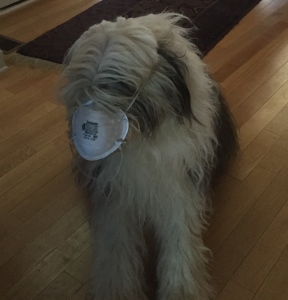The quick and easy answer is: YES, if the person who is ill is wearing the mask!
Recently, when talking to a dear friend, another nurse, and lamenting that I was hesitating taking unnecessary, though desired, plane travel due to concerns about the flu, she said to use a facemask. I pooh poohed it due to my experience using them while a labor and delivery room nurse many years ago. What I remembered is that once the paper surgical mask became moistened, due to the moisture we exhale while breathing, it became less effective as a barrier. After our discussion, I decided to research this further. After all, technology changes and this may be the answer to coughing, sneezing and nose blowing contamination from fellow passengers.
U.S. Center for Disease Control Doesn’t Recommend Masks
First, I checked out the U.S. Center for Disease Control website for their latest guidance. This is what I found: “CDC does not recommend the routine use of personal protective equipment (PPE), such as respirators, gloves, or surgical masks, for protection against avian influenza exposure (I projected this out to season flu exposures too, as the guidance is about the same), except in health care-related situations. However, gloves are recommended when cleaning potentially contaminated surfaces.” In lieu of gloves, hand washing for at least 30 seconds is key.
However, the CDC does recommend that there be a barrier between the ill person and everyone else. The following guidance is for air flight:
- If flight crewmembers or other personnel are concerned that a passenger traveling from an area with avian influenza may be infected, they should try to keep the ill passenger separated from the other passengers as much as possible (3-6 feet).
- If the ill passenger can tolerate a mask, provide a paper or gauze surgical mask to reduce the number of droplets coughed into the air.
- If a surgical mask is not available, provide tissues and ask the ill person to cover his or her mouth and nose when coughing and to put the used tissues into a wastebasket or bag.
- If an ill passenger is unable to wear a surgical mask, personnel may wear surgical masks when working with the ill person if 3 feet or closer. (Note that the person is supposed to be separated from others, so no need for facemasks for seatmates, as there should not be any! Just try to forget about the plane’s ventilation system.)
Surgical masks are designed to trap respiratory secretions not to prevent breathing in airborne microorganisms.
From an abstract of a study presented in part to the 48th Interscience Conference on Antimicrobial Agents and Chemotherapy/46th Infectious Diseases Society of America Annual Meeting, Washington, DC, 25-28 October 2008 (abstract K-4206) and printed in the Oxford Journal: Clinical Infectious Diseases comes this finding:
“Surgical masks are designed to trap respiratory secretions (including bacteria and viruses) expelled by the wearer and prevent disease transmission to others [4]. Surgical masks are not designed to prevent inhalation of airborne particles, and their ability to protect HCWs from disease acquisition varies. In contrast, N95 masks (termed respirators in the United States) are designed to reduce an individual’s exposure to airborne contaminants, including infectious viral or bacterial particles. Although N95 masks are designed to primarily protect the wearer from infection, they presumably also prevent transmission if fitted correctly on a patient at high risk of transmitting a virus [4]. However, some HCWs find the more expensive N95 masks difficult to tolerate [2, 6].*”
http://cid.oxfordjournals.org/content/49/2/275.full
There have been other studies that state that facemask could help reduce the spread of the flu or other droplet type infections that are airborne. Though, it depends on the mask. Also to note, many can’t tolerate wearing masks continually.
Best the ill person stay home and not spread the illness. For those of us who are well, hand washing seems to be the best way to reduce the chance of picking up any infection. As for me, I am going to stay home too. This is the peak of the flu season and I don’t want to throw myself into a wet and wild germ cloud unless it is truly necessary. I miss my grandkids, but we will Facetime for a while longer.
